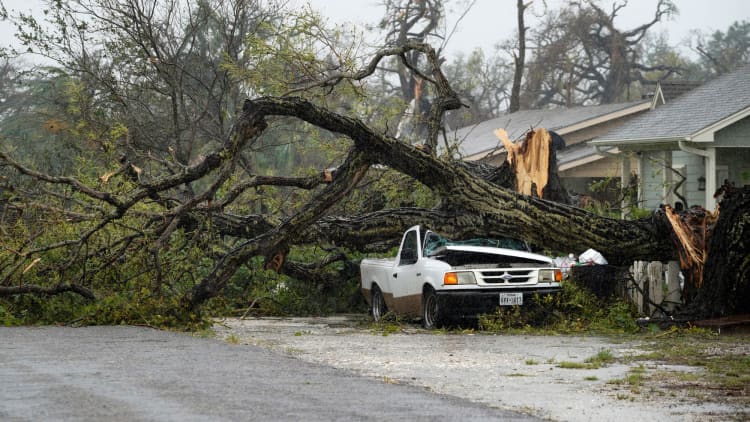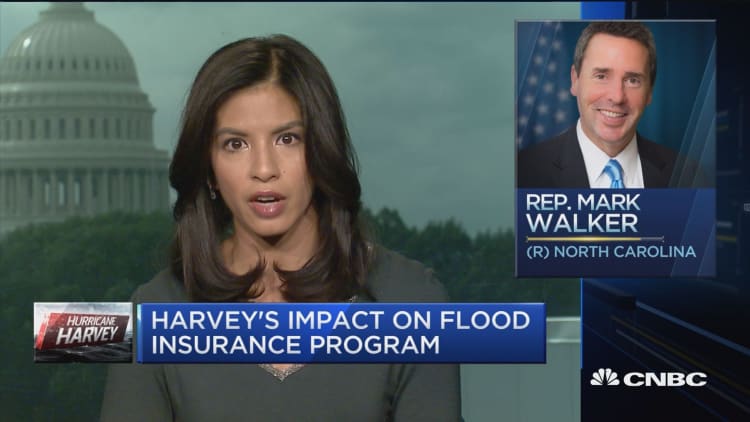
Consumers affected by Hurricane Harvey don't need to rush to file an insurance claim.
Warnings spreading on social media about a Sept. 1 deadline to file claims related to Hurricane Harvey are largely misinformation, experts say. The alerts reference a Texas law set to take effect this week that potentially reduces the penalties insurers face for late claim payments as a result of a lawsuit.
"[The law] has no impact on the insurance claims process, it only affects lawsuits," Texas State Senator Kelly Hancock said in a statement. Hancock serves as chairman of the State Senate committee that oversees the property and casualty insurance industry.
"The narrative that the claims process changes on Sept. 1 is false," he said in the statement. "There is no need to rush to file a claim. Put your safety first."
As The New York Times reports, the law won't affect most Texas homeowners whose property has flooded as a result of Hurricane Harvey. Most homeowners unfortunately don't have flood insurance (meaning they have no insurer to take to court), and the National Flood Insurance Program and the Texas Windstorm Insurance Association are both exempt from the state law.
There is no deadline to file insurance claims related to Harvey, said Loretta Worters, a vice president for the Insurance Information Institute. Texas consumers won't see the claims process, or their rights, change under the new state law.
"Regardless of the date the claim is filed, the insurer is going to work with them," she said.
"They still have legal rights under the consumer protection laws in the event the insurer engages in any bad faith conduct," she said. "They're protected."
For Texans, handling the insurance aspects of recovery probably aren't top of mind — nor should it be.
"The issue right now is safety — getting people out, evacuating," Worters said.
Once you're to a place of safety, here's how to start navigating the claims process:
Alert insurers
Insurance adjusters can't get in until the flood waters have receded, Worters said, but it helps to pre-emptively reach out and let your agents know your home and vehicle have sustained storm damage. That helps insurers know both where to go to look for damage, and where to find you in the coming days and weeks to more quickly provide assistance.
Another reason to act fast: Insurers often handle claims on a first-come, first-serve basis, said J. Robert Hunter, director of insurance for the Consumer Federation of America.
Consumers likely need to make several calls. (Ideally, policy numbers and agent contacts would have been part of an emergency "go bag.")
Homeowners: You may have several kinds of coverage. In addition to a primary homeowners insurance policy, some homeowners may also have separate wind damage coverage via the Texas Windstorm Association, and flood insurance with the National Flood Insurance Program or a private insurer, Worters said.
Don't assume you don't have coverage.Peter Kochenburgerdeputy director, Insurance Law Center
Even if you don't have flood insurance (only about 12 percent of homeowners do), call your home insurer, said Peter Kochenburger, deputy director of the Insurance Law Center at the University of Connecticut School of Law. Homeowners policies specifically exclude damage related to flooding, but water and wind damage are separate issues. (For example, you could be covered for water damage resulting from wind damage to the roof, or a flying tree branch that broke a window, he said.)
"Don't assume you don't have coverage," he said.
Auto: The comprehensive portion of your auto insurance typically would cover flooding and other storm-related damage, up to the vehicle's market value, Worters said.
Travel: Texans currently traveling should reach out to their travel insurance provider, if they bought a policy for their trip. The "trip interruption" portion could kick in for policyholders who need to cut short their travels due to the hurricane damaging property, said Megan Singh, project management director for insurance marketplace Squaremouth.
"They could actually be covered to return home," she said — including the cost of a new flight and reimbursement for hotel nights and other prepaid expenses left unused as a result of the shortened trip.
Keep good records
Take notes documenting every contact with your insurer, including who you spoke with, when, and what was said. Those details can be important if you later have any difficulty with your claim, or need to file a complaint, Hunter said.
"You want to be able to remember exactly what happened," he said.

Keep your claim numbers at hand for easy reference. That helps insurers route you quickly to the claims department, which will have the most up-to-date info on your claim, he said.
Save receipts
Your homeowners policy may include "additional living expense" coverage that provides reimbursement for immediate expenses like emergency repairs, temporary housing and meals, Kochenburger said. Ask your agent about that coverage. Insurers often reimburse those expenses quickly.
Explore alternatives
Consumers who don't have insurance or are underinsured aren't without recourse, Worters said.
Check DisasterAssistance.gov (run by the Federal Emergency Management Agency) to see if you qualify for grants or low-interest loans to help cover expenses such as temporary housing, emergency home repairs and property losses, she said. Nonprofits are also collecting donations to provide aid and supplies to people in need.


